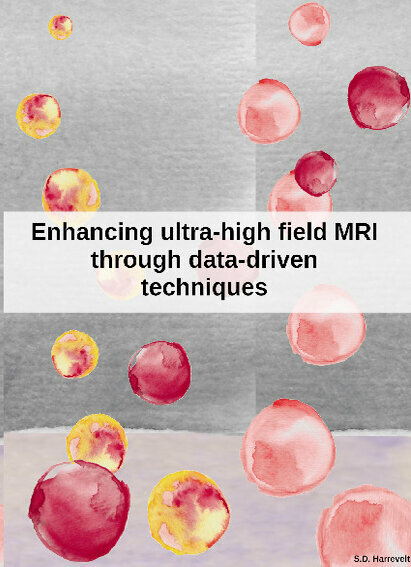Enhancing ultra-high field MRI through data-driven techniques
Seb Harrevelt defended his PhD thesis at the Department of Biomedical Engineering on July 10th.
![[Translate to English:] [Translate to English:]](https://assets.w3.tue.nl/w/fileadmin/_processed_/b/3/csm_Harrevelt%20Banner%20image_1b112630ec.jpg)
Ultra-high field (UHF) MRI refers to MRI systems with a magnetic field strength of 7 tesla (T) or higher. These systems offer significant benefits like higher signal-to-noise ratio and enhanced functional contrast mechanism. However, higher field strengths also result in increased magnetic field inhomogeneities. Also, the radiofrequency (RF) field, which is used to excite the atomic nuclei, becomes more inhomogeneous and the concomittantRF power deposition is increased, especially in whole-body imaging. Innovations such as the phased array, parallel imaging, and advanced reconstruction methods have improved UHF MRI image quality. Recently, machine learning (ML) and artificial intelligence (AI) techniques have emerged with great potential for various MRI applications. For his PhD thesis, Seb Harrevelt explored potential applications of AI techniques specifically for UHF imaging.

The first application explored by Seb Harrevelt as part of his PhD research uses a deep learning approach to correct RF field inhomogeneities in 7T prostate imaging, outperforming the traditional N4-algorithm.
The second application focused on developing a field strength-agnostic cardiac segmentation network using different augmentation methods to generate training data.
For the third study, Harrevelt sought to reconstruct 7T cardiac images from undersampled data by fine-tuning pre-trained networks showing that minimal additional 7T data enhances performance.
Lastly, as part of the Dutch National 14T MRI Initiative, Harrevelt and his colleagues compared multiple potential RF antenna array designs for 14T imaging by simulating their RF field and the corresponding distribution of power deposition.
Title of PhD thesis: Enhancing ultra-high field MRI through data-driven techniques. Supervisors: Josien Plum and Alexander Raaijmakers.